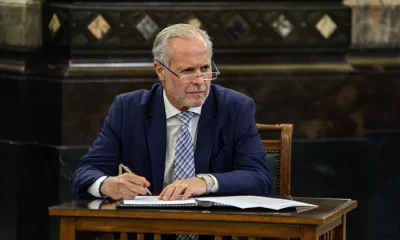International
Uruguayan government rejects warnings about water crisis

July 14 |
A group of experts from the United Nations (UN) on Thursday urged the government of Uruguay to prioritize the use of fresh water for human consumption in the context of the water crisis that the South American country is going through, which was not favorably received by the government of Luis Lacalle Pou.
In a letter, whose signatories include the Special Rapporteur on the Human Right to Drinking Water and Sanitation, Pedro Arrojo-Agudo and the president of the Working Group on Business and Human Rights, Damilola Olawuyi, warns that 60 percent of the population has been affected by the increase in water salinity.
The specialists, with several years of experience, stressed that “although the high salt indices are attributed to the failure of water infrastructure, aggravated by abnormally long periods of water stress, the underlying problem is the overexploitation of water, especially by some industries in the country”.
For these reasons, they said, “it is necessary to deepen measures to ensure that all people have access to the water necessary for life,” because these high levels of salinity, for example, “significantly affect vulnerable groups, such as children and adolescents, pregnant women and people suffering from chronic diseases.
The experts acknowledged the efforts made by the Uruguayan Executive, such as the exemption of bottled water from taxes; however, the government responded to the exhortation through a statement from the Ministry of Foreign Affairs in which it described the experts’ statements as “inaccuracies”.
For its part, the Uruguayan Foreign Ministry notified that the values of chlorine and sodium in the water “are not considered alarming, since the increase authorized in order to ensure the supply has been evaluated by the health and academic authorities, who have considered that the great majority of the population can continue consuming it”.
In the text, the diplomatic entity recalled that the Ministry of Social Development provided for its beneficiaries (supported by family allowances, old age assistance, passive people receiving minimum income) a monetary support to buy 60 liters of water per month, particularly pregnant women and children under 2 years of age.
The text also remarked that, as a way of preventing the water crisis and preserving the health of the population, the administration of Obras Sanitarias del Estado (OSE) and the Executive designed a strategy based on “maintaining the continuity of the public supply without making supply cuts”.
Likewise, “to maintain the sanitation service so that the more than 550,000 homes in the Metropolitan Region can evacuate domestic wastewater, and to keep the distribution networks continuously operational to fight and protect against fires and urban disasters”, it explained.
The text in question emphasizes that “the Government never recommended reducing human consumption of water, but its reduction in non-essential activities in order to ensure better water quality for a longer period of time”. In this sense, it adds that “water is still drinkable”.
International
Trump Floats “Friendly Takeover” of Cuba Amid Rising Tensions

U.S. President Donald Trump said Friday that his administration is considering what he described as a “friendly takeover” of Cuba, as Washington continues to increase pressure on the island’s communist government.
“The Cuban government is talking to us and they have very serious problems, as you know. They have no money, they have nothing at this moment, but they are talking to us and maybe we will see a friendly takeover of Cuba,” Trump told reporters as he departed the White House for a trip to Texas.
Earlier in the week, U.S. Secretary of State Marco Rubio said Cuba needed a “radical change,” shortly after Washington eased restrictions on oil exports to the island for what officials described as “humanitarian reasons,” amid a deep economic crisis.
The United States has imposed an energy blockade on Cuba since January, citing what it calls an “extraordinary threat” posed by the communist-run island, located roughly 150 kilometers (90 miles) off the coast of Florida, to U.S. national security.
International
Argentina’s Senate Reviews Milei-Backed Labor Overhaul

Argentina’s Senate on Friday began reviewing the Labor Modernization Law promoted by the administration of President Javier Milei, a proposal that would significantly reshape labor rules across the country.
The upper chamber opened its final discussion of the contentious initiative, which revises the method used to calculate severance payments — lowering the amounts owed in dismissal cases — and introduces an “hour bank” mechanism that allows overtime to be offset with paid leave rather than extra wages.
The legislation also broadens the classification of essential services, a change that would place new limits on the right to strike in designated sectors.
The bill was initially approved by the Senate on February 11 and then moved to the Chamber of Deputies, where lawmakers passed it with amendments. It has now returned to the Senate for definitive approval.
Outside the Congress building in Buenos Aires, workers, trade unions and left-wing organizations staged demonstrations beginning at midday. The gathering later thinned out amid reports of disturbances and a strong police presence. Security forces had secured the area surrounding the legislature since early morning hours.
Union leaders contend that the reform weakens labor protections, while many business representatives back the measure but stress that sustainable formal employment will require economic expansion, improved credit conditions, greater investment and a more dynamic domestic market.
International
Federal Judge Blocks Trump Policy Allowing Deportations to Third Countries

A federal judge ruled on Wednesday that the policy of U.S. President Donald Trump’s administration allowing immigration authorities to deport foreign nationals to third countries without prior notice or the opportunity to object is unlawful. The decision marks another legal setback for the administration on immigration matters.
Judge Brian Murphy of the U.S. District Court for the District of Massachusetts struck down the regulation issued last year, which stated that Immigration and Customs Enforcement (ICE) was not required to notify migrants if they were to be sent to countries other than the one listed in their removal order, provided that receiving nations offered assurances they would not face persecution or torture.
Murphy ordered the measure vacated but granted a 15-day delay before the ruling takes effect, giving the Trump administration time to file an appeal.
In his decision, the judge concluded that the policy violates federal immigration law and migrants’ due process rights. He also questioned the lack of transparency surrounding the alleged assurances provided by receiving countries, stating that “no one really knows anything about these supposed ‘assurances.’” He added, “It is not right, and it is not lawful.”
The ruling follows several legal disputes involving deportations to third countries. Last year, the executive branch deported more than 200 Salvadorans to a maximum-security prison in El Salvador, invoking an old wartime law. The White House also held talks with Costa Rica, Panama, and Rwanda about receiving migrants who are not citizens of those countries.
In May, the same judge determined that the government violated a court order when it attempted to remove a group of immigrants with criminal records to South Sudan without prior notice or an opportunity to raise claims of fear of persecution.
Although President Donald Trump took the case to the U.S. Supreme Court, which temporarily allowed the deportations to resume while a final decision was pending, the White House is expected to again appeal to higher courts to overturn this latest judicial ruling.
-

 International3 days ago
International3 days agoFamily of “El Mencho” Seeks Return of Body After Deadly Military Operation
-

 International3 days ago
International3 days agoLarry Summers Steps Down from Harvard Role Amid Epstein Controversy
-

 International3 days ago
International3 days agoIran’s President Optimistic Ahead of Geneva Nuclear Talks with U.S.
-

 International3 days ago
International3 days agoBill Gates Admits “Serious Mistake” Over Epstein Ties
-

 International3 days ago
International3 days agoStephen Hawking Photo Appears in Newly Released Epstein Documents
-

 International5 days ago
International5 days agoOver 40 Million Affected by Major Snowstorm in Northeastern U.S.
-

 International2 days ago
International2 days agoCocaine Production Surges 34% in 2023 as Market Expands into Africa and Asia
-

 International5 days ago
International5 days agoNine People Killed in Two Armed Attacks in Manabí, Ecuador
-

 International2 days ago
International2 days agoFederal Judge Blocks Trump Policy Allowing Deportations to Third Countries
-

 International2 days ago
International2 days agoClinton Accuses Republican Committee of Using Epstein Case to Shield Trump
-

 International20 hours ago
International20 hours agoArgentina’s Senate Reviews Milei-Backed Labor Overhaul
-

 International19 hours ago
International19 hours agoTrump Floats “Friendly Takeover” of Cuba Amid Rising Tensions


































